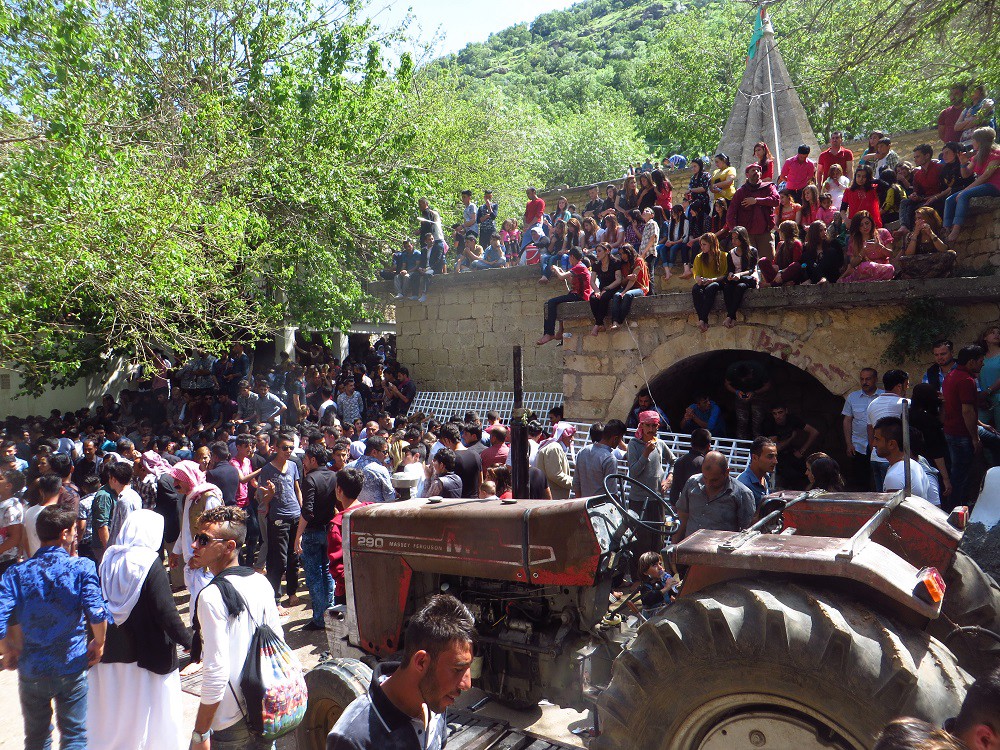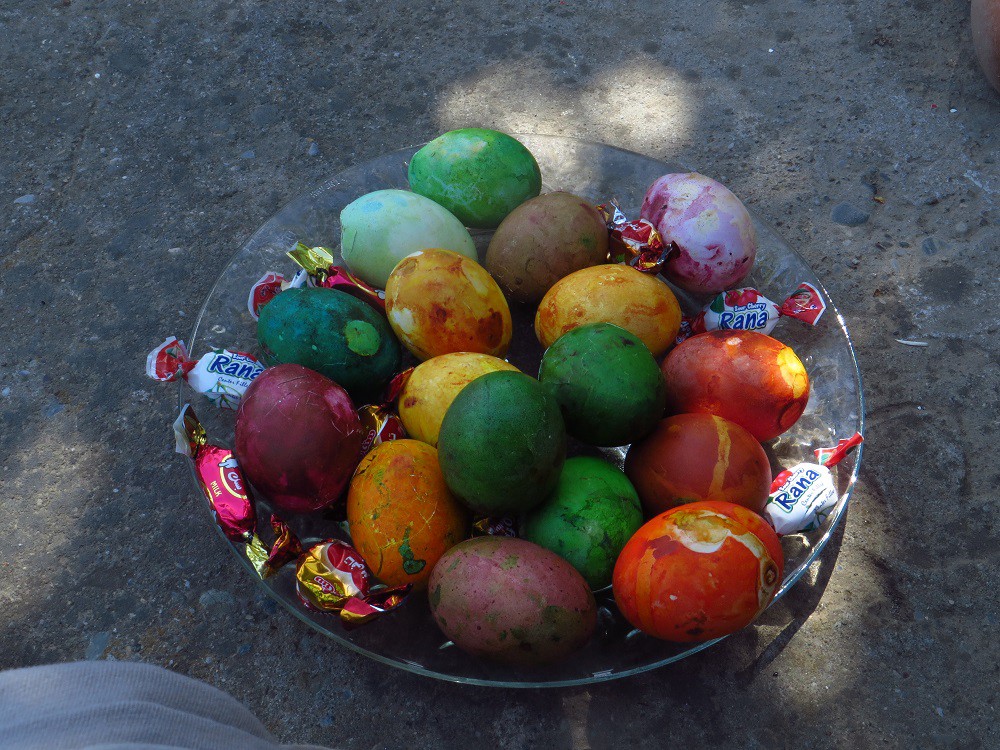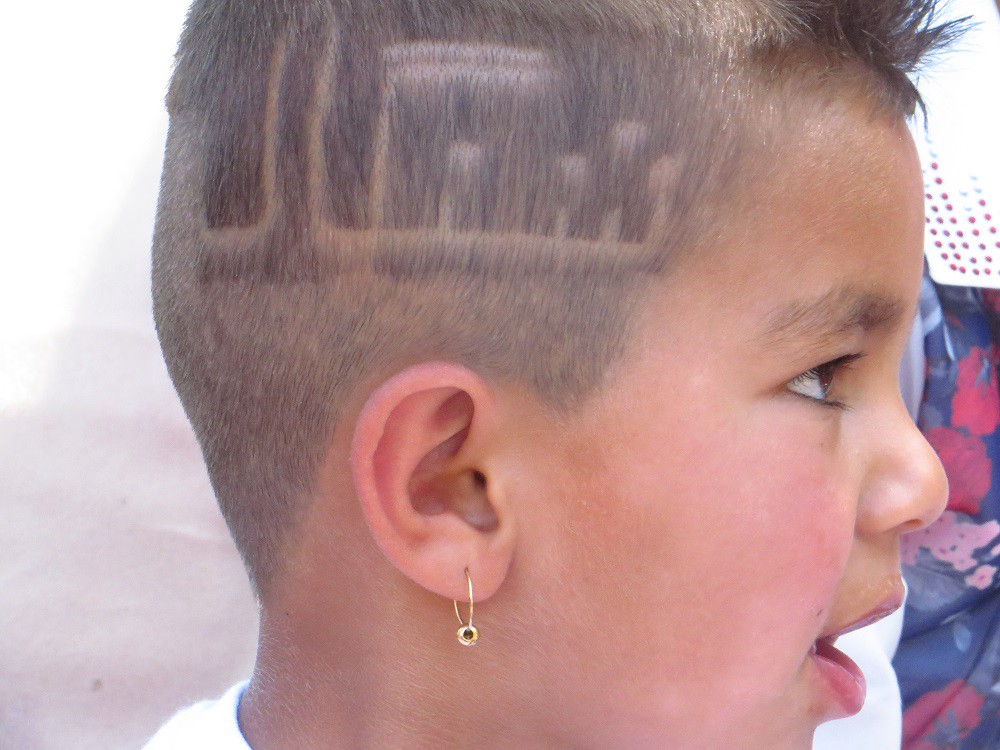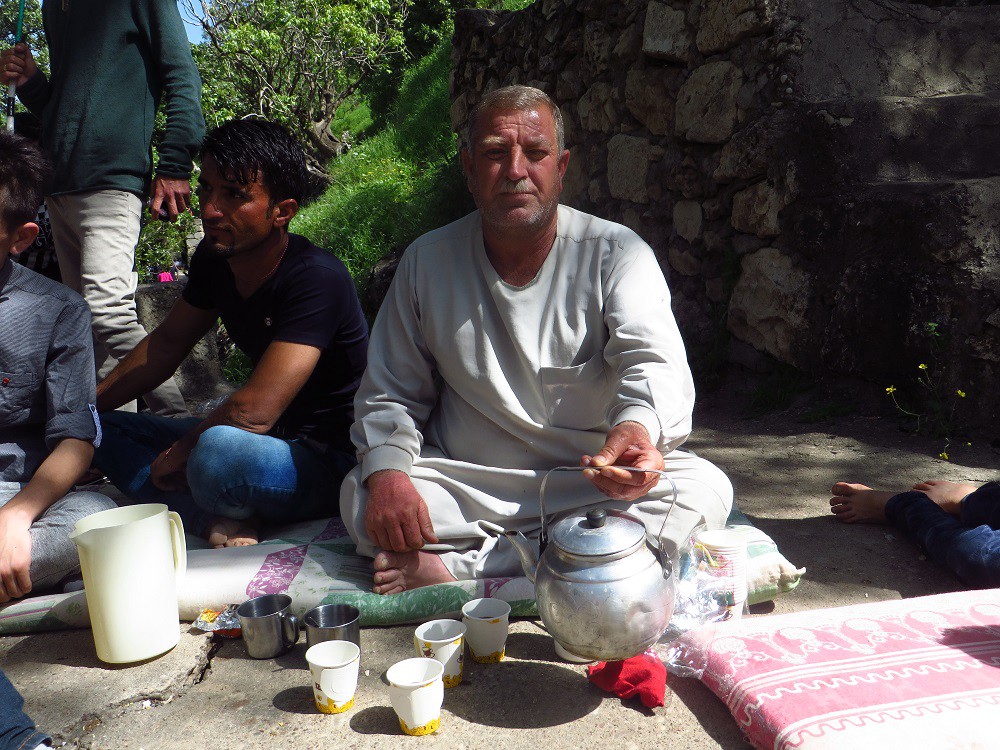Red Wednesday In Lalish
by Dawson Jope

It was only a few minutes past nine in the morning, but the uneven concrete was already very warm below my feet. I was enjoying the rough surface on my soles. Going barefoot is the first custom of visiting Lalish, the most sacred village of the Yazidi faith, in Northern Iraq. Lalish was purportedly the spot where Melek Taus, a central figure in the religion also known as the Peacock Angel, first touched down to earth, immediately making the small valley a holy place. It is also home to the tomb of Sheikh Adi, the eleventh-century reformer of Yazidism. I walked up to the village among thousands of other pilgrims, all barefoot and budding with excitement. It was “Sere Sal,” the Yazidi New Year, also known as Red Wednesday, the day that Melek Taus descended upon earth. Rebirth, redemption and new beginnings are a focal point of the religion, and Sere Sal was the day to see it in full bloom.

Lalish lies in a valley with a narrow opening to the northern edge of the Plains of Nineveh. The valley is short and shallow, surrounded on three sides by the small mountains that make up the southern edge of the Zagros range in northern Iraq. The southern mountaintop above Lalish looks out above the vast plains of northern Iraq that slowly morph into the inhospitable Syrian Desert beyond the horizon.
From that same vantage point, the city of Mosul and Mosul Lake are clearly visible, the latter safely in the hands of the Peshmerga and Coalition forces, the former still under the control of the Islamic State, or “Da’esh” as it is known in the Middle East. It’s not unusual to drive along the Plains of Nineveh and see massive plumes of smoke on the horizon behind the rolling hills. Sometimes they are accompanied by the distant roar and fade of fighter jets.
On a perfectly clear day, Mt. Sinjar is visible from the mountain above Lalish. Sinjar, or “Shingal” as the Yazidis call it, is the next most sacred location after Lalish, and was home to one of the greatest concentrations of Yazidis prior to the 2014 Da’esh attack. The offensive led to a ghastly massacre that killed tens of thousands of Yazidis and displaced a few hundred thousand. The event was only retroactively labeled a genocide by the U.S. Government.

I took a staircase to the roof of a small house where I planned to sit and watch the influx of people heading into the village to picnic and celebrate. Lalish has an openness that is unusual in Iraq — walkways, houses and rooftops are almost indistinguishable in their openness — all space is shared and free to everyone, all of it an extension of the Yazidis’ belief in unconditional hospitality. I was only on the rooftop for a matter of seconds when a man called out to me.
“Hello friend! Please, come join us!” He and his family sat in a large rectangle of pillows on the far end of the rooftop, below the shade of a sprawling fig tree, enjoying chai with trays of baked cakes and brightly dyed hard-boiled eggs. I sat down next to him as he made space on one of the large red cushions. He gave his name as Sam, and introduced me to his extended family of brothers and sisters, nieces and nephews, grandparents and friends.

“Have an egg,” he told me, “We will compete, and if I win, I get yours.” I was familiar with the tradition, and in the spirit of competition, hospitality and brotherhood, we both held our eggs vertically. The top egg had to try to crack the bottom one; whoever’s didn’t crack won both. Sam won to cheers from his family, and challenged me to a rematch which I won in return. I asked about the significance of the eggs.
“It is simple really, the egg,” he explained, “the beginning of the cycle of life. Everything comes from the egg. And all of the colors? Because every life has different colors! It helps that eggs taste good too!” He added for good measure and a quick laugh. After Sam and I had our fill of eggs, we sat and talked, and after some time I told him I wanted to explore some other parts of the village for a while. He obliged, and told me that as his family’s honored guest I was not only invited, but expected to partake in their lunch feast. I accepted and gave him my phone number before I left.

I continued wandering around and stopping to drink tea and talk with people. One young man named Kalar stopped and thanked me for taking the time to visit. He took it upon himself to be my informal guide and showed me a few of the small temples scattered across the village. At one temple, an older man sat beside the door as if he were a guard; he welcomed and greeted everyone as they came in. Directly above him, over the door crest, a vibrant red poppy was stuck to the frame, held in place by a sort of surprisingly cohesive Yazidi stucco made from egg.
The informal guard thanked me and shook my hand for patronizing his temple. He told me, “Many of us are sad, but it is important to keep the good things we have. Most of us have lost a lot in the last few years. For all of the people we love who we have lost we still have many more that we love, and today is important for us to remember everyone and enjoy seeing everyone else. I am glad that you are here, because it shows that the world cares.” I thanked him in return, and after sharing a chai, continued through the steep village.
Time passed quickly as I hopped along, and when my pocket started buzzing, I knew Sam was calling to make sure I was on my way for lunch. I looked out over a rooftop just before rejoining Sam and his family; the number of people in Lalish had now climbed into the tens of thousands. I said my hellos once more upon revisiting Sam, and with a warming “Karemka!” which loosely translates to “enjoy the feast,” he beckoned us all to begin. Lunch was extensive, with many different families’ versions of dolma and chicken biryani rice.

After lunch, Sam beckoned for his young son, Oman, to come shake my hand. He was no older than four, but he already had his father’s warm smile. Oman blushed and gave me a small wave before he hesitantly shook my hand. I noticed he had something shaved into the side of his head. I understood just enough of the Arabic alphabet to figure out that it said “Shingal.” I asked Sam if he and his family had come from Shingal. “Yes,” he replied, “I am Shingali. Everyone sitting here with you is. We left in 2014, and we have been living in a camp ever since.”

Yazidism is a dualistic religion that rejects the notion of sin and instead considers it part of the same reality as goodness. Its most important figure in the faith after God is the Peacock Angel, Melek Taus, who some argue is parallel to “Shaitan” in Islamic texts, or Satan in Christianity — the embodiment of sin and evil, providing the strong dualistic balance to god’s empathy, compassion, and goodness. Because of this origin story, Yazidis have been negatively stereotyped by some Muslims as devil worshippers.
The story goes, after God created the world, he entrusted it to seven angels, Melek Taus among them. He was a proud and arrogant angel, and refused to submit to God and bow to Adam. When brought before God, he was able to recognize his faults and identify his wrongdoings. He was spared punishment in recognition for his boldness, and after repenting, was reborn as the Peacock Angel. His story symbolizes the redeemable nature of many who wrong, and Yazidis’ rejection of outright evil. The Yazidis’ archangel is symbolically flawed, correctible, and human as those on earth who worship him.

I asked Sam to tell me what he thought was the most important thing that the world should know about Yazidis.
“I want them to know who we are, and that we only want peace,” he said. “I want you to feel comfortable in my home, and for my home to be your home. I want you to know that if you respect me once, I will respect you one hundred times.”
Sam continued, “You know, even though we are safer now, it is not safe here. People do not like us, and I do not mean just Da’esh. It’s not safe here, but I want to stay. I have family in America, and I have family in Germany. But I do not want to leave, because if everyone who wants peace keeps leaving here, who will there still be to keep it? Peace can only be built by those who want it and are willing to stay.”
For Yazidis, New Year’s Day is a celebration of Melek Taus and the circular process of life and death, as well as the tremendous resilience of their people and survival through consistent adversity. From the hilltop above them, war is still visible. But in the valley below, generosity and life go on unabated. The war will eventually come to an end, and when it does, it will need people like Sam and his family, who are willing to stay and invest in the peace that follows, and build new cycles of life.
